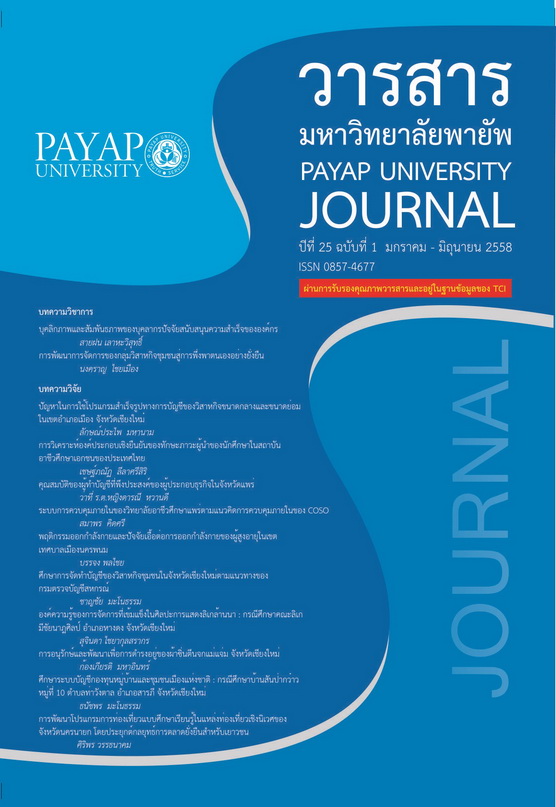การพัฒนาการจัดการของกลุ่มวิสาหกิจชุมชนสู่การพึ่งพาตนเองอย่างยั่งยืน
Main Article Content
บทคัดย่อ
บทความเรื่อง “การพัฒนาการจัดการของกลุ่มวิสาหกิจชุมชนสู่การพึ่งพาตนเองอย่างยั่งยืน” เขียนขึ้นโดยมีวัตถุประสงค์เพื่อนำเสนอความจำเป็นของการพัฒนาการจัดการของกลุ่มวิสาหกิจชุมชนต่างๆ ตามหลักปรัชญาของเศรษฐกิจพอเพียง เพื่อมุ่งหวังให้มีการเติบโตและพัฒนาสู่การพึ่งพาตนเองอย่างยั่งยืนได้อย่างยาวนาน ซึ่งกลุ่มต้องมีการพัฒนาภายใต้องค์ประกอบของการจัดการใน 2 มิติ ดังนี้ คือ 1) มีปรัชญาการจัดการ ซึ่งแนวคิดนี้มีหลักสำคัญ 4 ประการดังนี้ คือใช้แนวคิดอนุรักษ์นิยมทางการเงิน มีความระวังระไวกับสิ่งแวดล้อมที่เปลี่ยนแปลง มีความสามัคคีและให้ความสำคัญกับการสร้างเอกลักษณ์ และมีความอดทนสูงต่อความคิดและไอเดียใหม่ๆ และ 2) มีกระบวนการจัดการเชิงกลยุทธ์อย่างเป็นระบบเพราะมีบทบาทสำคัญต่อการจัดการของกลุ่มวิสาหกิจชุมชนในปัจจุบันเป็นอย่างยิ่ง เนื่องจากเป็นการกำหนดวิสัยทัศน์ ภารกิจ วัตถุประสงค์ กลยุทธ์ นโยบาย รวมไปถึงการติดตามและประเมินผลของกลุ่มอย่างเป็นระบบ หรือเป็นการตอบคำถามว่า “ทำไปทำไม” เพื่อให้กลุ่มมีทิศทางและเป้าหมายที่ชัดเจนในการทำหน้าที่เป็นองค์กรที่ช่วยสร้างและพัฒนาเศรษฐกิจของชุมชนตลอดจนถึงประเทศชาติ
Article Details
เอกสารอ้างอิง
นงคราญ ไชยเมือง และคณะ. (2554). การพัฒนาชุมชนตามหลักปรัชญาของเศรษฐกิจพอเพียง : กรณีศึกษาชุมชนบ้านสันกลาง ตำบลจำป่าหวาย อำเภอเมือง จังหวัดพะเยา. เชียงใหม่. สำนักงานคณะกรรมการวิจัยแห่งชาติ (วช.).
นงคราญ ไชยเมือง. (2556). การพัฒนาศักยภาพการจัดการกลุ่มผลิตน้ำดื่มโรงเรียนบ้านจำป่าหวาย ตำบลจำป่าหวาย อำเภอเมือง จังหวัดพะเยา. เชียงใหม่. มหาวิทยาลัยพายัพ.
ผลิน ภู่เจริญ. (2550). ความพอเพียงที่ยิ่งใหญ่และยั่งยืนกับการจัดการร่วมสมัยตัวแบบธุรกิจ “ล้นเกล้า” ศูนย์ศึกษาเศรษฐกิจพอเพียง สถาบันบัณฑิตพัฒนบริหารศาสตร์.
“พระราชบัญญัติวิสาหกิจชุมชน” (2558). [ออนไลน์]. แหล่งที่มา http://sceb.doae.go.th/law.htm (10 กุมภาพันธ์ 2558)
พักตร์ผจง วัฒนสินธุ์ และพสุ เดชะรินทร์. (2542). การจัดการเชิงกลยุทธ์และนโยบายธุรกิจ. กรุงเทพฯ : โรงพิมพ์แห่งจุฬาลงกรณ์มหาวิทยาลัย.
ศิริวรรณ เจนการ และคณะ. (2558). โครงการพลังแผ่นดิน : กรณีศึกษาด้านธุรกิจชุมชน.
มูลนิธิบูรณะชนบทแห่งประเทศไทย ในพระบรมราชูปถัมภ์. [ออนไลน์]. แหล่งที่มา http://www.pattanathai.nesdb.go.th/PTFweb/Interesting_menu/Rbusiness.doc. (6 กุมภาพันธ์ 2558)
สุเมธ ตันติเวชกุล. (2549). ปรัชญาเศรษฐกิจพอเพียงพระเจ้าอยู่หัว. กรุงเทพฯ : แสงดาว.
เสรี พงศ์พิศ. (2558). โอทอป ความคิดมีค่ากว่าเงิน. [ออนไลน์]. แหล่งที่มา http://www.phongphit.com/2013/index.php/2012-12-06-11-48-33/item/612-2014-12-18-14-24-01 (6 กุมภาพันธ์ 2558)
อภิชัย พันธเสน. (2550). สังเคราะห์องค์ความรู้เกี่ยวกับเศรษฐกิจพอเพียง. กรุงเทพฯ: สำนักงานกองทุนสนับสนุนการวิจัย (สกว.)
อัจฉรา จันทร์ฉาย. (2551). การวางแผนกลยุทธ์และการจัดทำ BSC. พิมพ์ครั้งที่ 11 กรุงเทพฯ : โรงพิมพ์แห่งจุฬาลงกรณ์มหาวิทยาลัย.
Thompson, Arthur A.and Strickland III, A.J. (1999). Strategic Management : Concepts and Cases. 11th Boston : McGraw-Hill, Inc.
Wheelen, Thomas L. and Hunger, J. David. (2010). Strategic Management and Business Policy : Achieving Sustainability. 12th., International ed. Upper Saddle River, N.J. : Prentice.


